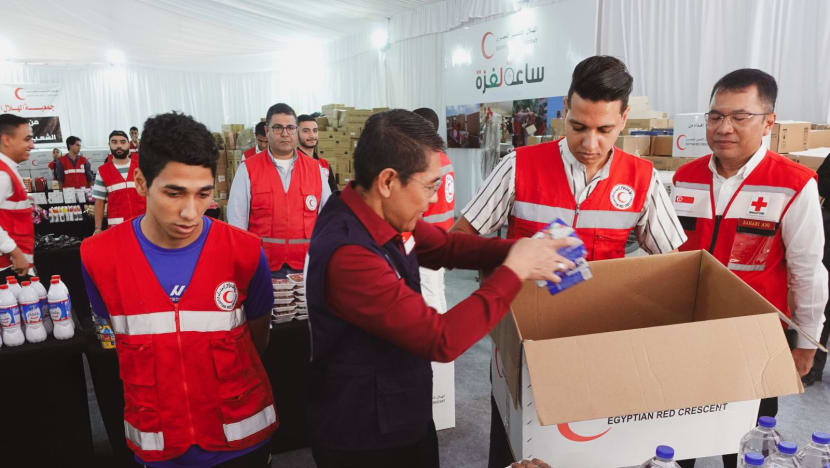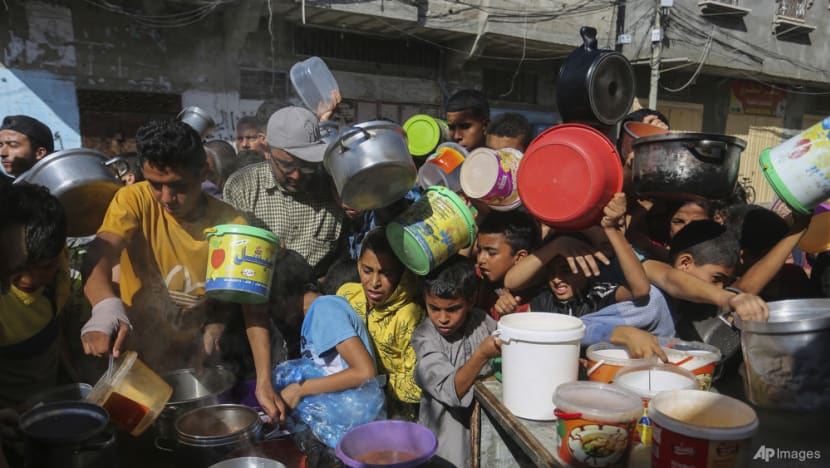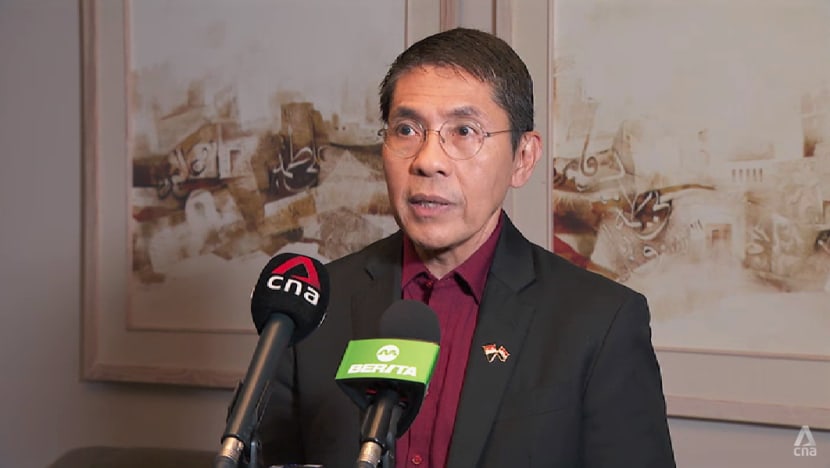Singapore offers to send medical team to Egypt to aid in Gaza humanitarian relief efforts
The efforts that Singaporeans have put in so far, including their donations for humanitarian aid to Gaza, “speak volumes of the generosity… and the passion that they have towards helping the innocent victims”, said Second Foreign Affairs Minister Maliki Osman.

Second Minister for Foreign Affairs Dr Mohamad Maliki Osman packing items to be handed over to the Egyptian Red Crescent. (Photo: Ministry of Foreign Affairs, Singapore)

This audio is generated by an AI tool.
CAIRO: Singapore has offered to send a medical team to Egypt, which shares the Rafah border crossing with conflict-hit Gaza, and is preparing to send more medical supplies amid a growing humanitarian crisis in the besieged enclave.
“We are working very closely with our Egyptian counterparts to see how best we can continue to help them,” said Second Foreign Affairs Minister Maliki Osman on Saturday (Nov 11), as he wrapped up a visit to Egypt to hand over donations for humanitarian efforts in Gaza.
“We had good discussions with the different ministers, including exploring the possibility of sending a medical team to Egypt to help with medical support.
“They articulated the need for more medical supplies and I have contacted our community back home to very quickly look at the list of medical supplies that's required, so that we can help send over here because they did also say that the challenge is to procure some of these medical supplies locally.”
HUMANITARIAN AGENCIES BRACING FOR LONG HAUL
With no end in sight to the conflict between Israel and Hamas, humanitarian agencies in Egypt are bracing for the long haul.
But there has been some respite, with more supply trucks making their way from Egypt's Rafah crossing into Gaza.
Dr Maliki said: “Egypt plays a very important role being an interlocutor, being the country that's nearest to Gaza. The current only opening that exists to bring in humanitarian aid to Gaza is really through the Rafah border in Egypt.”
Singapore has been helping - having handed more than S$2 million (US$1.47 million) in cash and over S$400,000 in supplies - and wants to do even more.
“We acknowledge the fact that whenever there is a crisis, wherever it may be, a humanitarian crisis affects Singaporeans and many people around the world,” said Dr Maliki, assuring Singaporeans that much is being done to help the victims in Gaza.

The city-state is also engaging companies and charities at home, as well as the Egyptian government.
Dr Maliki added that the efforts that Singaporeans have put in so far, including their donations for humanitarian aid to Gaza, “speak volumes of the generosity… and the passion that they have towards helping the innocent victims”.
PUSHING FOR A NEGOTIATED TWO-STATE SOLUTION
In the longer-term, however, Singapore, like many other countries, believes a negotiated two-state solution for Israel and the Palestinians is the best outcome.
At the same time, there is a call for the international community to come together to push this forward.
“That's really where we hope Singaporeans can understand that in this region, the leaders of the Arab countries are coming together to find solutions towards this two-state solution. It is something that we aspire towards,” said Dr Maliki.
“We aspire for peace and stability in the region, and for that to happen, we hope for the realisation of the two-state solution. It will take some time, but I think it's good for Singaporeans to understand the dynamic process that's happening today in the region, and we hope for the best.”
Singapore has voted in favour of a United Nations resolution to protect civilians and uphold legal and humanitarian obligations amid the conflict.
This would allow “humanitarian assistance to get into Gaza as soon as possible, so that the dire situation can be mitigated, and that we can treat the wounded at the same time”, said Dr Maliki.
“So there is still much to be done, and we can continue to support them.”
LOOKING FOR ECONOMIC OPPORTUNITIES IN THE REGION
Even as Singapore keeps its eye on the conflict, it continues to look for economic opportunities in the region.
“We should continue to see where we can grow because otherwise, if you're saddled with trying to solve one problem and not allow others to move, then you cannot develop or you cannot take advantage of economic opportunities,” said Dr Maliki.

He highlighted how both Singapore and Egypt share various similarities, including “the same vision of bringing our economy forward”.
“We want to grow the economy. We want to work together with different partners. Egypt is open in terms of economic outlook, so is Singapore,” he added.
“There are significant opportunities for Singapore and companies to come here. We already have got significant investments here.”
Officials in Egypt have expressed their interest in engaging potential partners in Singapore such as port operators.
Dr Maliki said there is much potential for collaboration between the two nations given their respective statuses as maritime hubs.
“They are also interested in inviting Singapore companies to develop industrial estates, because they know that Singapore has experience in developing industrial zones in different countries,” he added.
ATTRACTING BUSINESS OPPORTUNITIES
With the Suez Canal Special Economic Zone providing what Egypt calls a friendly business environment, Singapore firms can look forward to a new dawn in a new region.
Often, one of the challenges faced by Singapore businesses is not being able to understand the complexities of a particular country in a particular region.
The special economic zone “provides greater opportunities for Singaporean businesses to start working here and start building up their portfolio here”, said Dr Maliki, adding that companies can then navigate around complex policies and systems.
“Once you have an economic zone that's ring-fenced, it allows Singaporean businesses to start and have a footing here. Once you have a footing here, you get comfortable, you know exactly how to do business, you see growth, and you can expand beyond the economic zone.”
He added that such a move allows Egypt to look at how they can expand further to attract investments.
Dr Maliki said the Middle East has transformed significantly over the last 20 years, noting that the region is opening up and countries are providing opportunities for investments.
“I've seen how the officials are open to business and how they want to attract Singaporean businesses. They have the confidence in also using Singapore as a gateway to Southeast Asia,” he added.
“So this is really where we can take advantage of that relationship.”

















